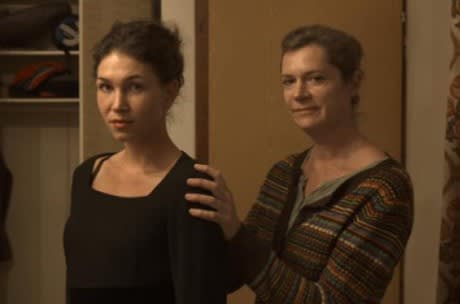Though very little action or conflict occurs on screen, Daniel Hoesl's modern pseudo-feminist character play, Soldate Jeannette, is infused with a quiet rage and flippant punk attitude. It's possibly the most subdued film ever made about anarchic ethos, juxtaposing reductionist roles of the modern woman in town and country and then ripping the socially imposed box they're expected to exist within to shreds.
With carefully framed, stationary camerawork, often showing characters from behind or contrasting close-up with cold, empty urban space, this social critique starts with Fanni (Johanna Orsini-Rosenberg) trying on an expensive red dress and touring around town to various social outings. Called out early for stealing two-hundred thousand euro from a communal trust, it's clear that her financial situation is spiralling out of control, even though she won't acknowledge it verbally or respond emotionally to the rapidly imposing reality of being evicted.
Friends tell her that she should have just married to secure her financial situation, which is juxtaposed with her eventual preservationist decision to simply go home with a different man every night for a place to stay.
But while Soldate Jeannette is conscious of the cold superficiality of keeping up appearances and the garish nature of social inclusion as performance of status, Hoesl's film isn't interested in merely making its protagonist a martyr. Instead, Fanni is revealed to be far more calculated and conniving than originally positioned through a mod-movie revelation.
From here, she travels to the remote countryside through the Alpine mountains where she finds Anna (Christina Reichsthaler), a young woman that works in a slaughterhouse and spends most of her time subjected to standard male misogyny and passive objectification, which is something reiterated by a visual metaphor of her interaction with an insistent pig.
While it's implicitly obvious why these two women would find some sort of bond, the very mechanical, deliberately formal, manner in which the story is told forced the audience to remain analytical about the on-screen happenings. We're never invited to engage in their kinship on an emotional level, nor does anything in the film address anything resembling tenderness, save Fanni's insistence than Anna wear one of her dresses.
Subversion and polemics are of far more importance here than emotional realizations, which is a very interesting and counterintuitive choice for a movie looking to thumb its nose at the expectations imposed on women from all walks of life. Resultantly, Soldate Jeannette is the sort of film that is respected more than it is enjoyed or remembered.
To read our exclusive interview with director Daniel Hoesl, click here.
(Independent)With carefully framed, stationary camerawork, often showing characters from behind or contrasting close-up with cold, empty urban space, this social critique starts with Fanni (Johanna Orsini-Rosenberg) trying on an expensive red dress and touring around town to various social outings. Called out early for stealing two-hundred thousand euro from a communal trust, it's clear that her financial situation is spiralling out of control, even though she won't acknowledge it verbally or respond emotionally to the rapidly imposing reality of being evicted.
Friends tell her that she should have just married to secure her financial situation, which is juxtaposed with her eventual preservationist decision to simply go home with a different man every night for a place to stay.
But while Soldate Jeannette is conscious of the cold superficiality of keeping up appearances and the garish nature of social inclusion as performance of status, Hoesl's film isn't interested in merely making its protagonist a martyr. Instead, Fanni is revealed to be far more calculated and conniving than originally positioned through a mod-movie revelation.
From here, she travels to the remote countryside through the Alpine mountains where she finds Anna (Christina Reichsthaler), a young woman that works in a slaughterhouse and spends most of her time subjected to standard male misogyny and passive objectification, which is something reiterated by a visual metaphor of her interaction with an insistent pig.
While it's implicitly obvious why these two women would find some sort of bond, the very mechanical, deliberately formal, manner in which the story is told forced the audience to remain analytical about the on-screen happenings. We're never invited to engage in their kinship on an emotional level, nor does anything in the film address anything resembling tenderness, save Fanni's insistence than Anna wear one of her dresses.
Subversion and polemics are of far more importance here than emotional realizations, which is a very interesting and counterintuitive choice for a movie looking to thumb its nose at the expectations imposed on women from all walks of life. Resultantly, Soldate Jeannette is the sort of film that is respected more than it is enjoyed or remembered.
To read our exclusive interview with director Daniel Hoesl, click here.




